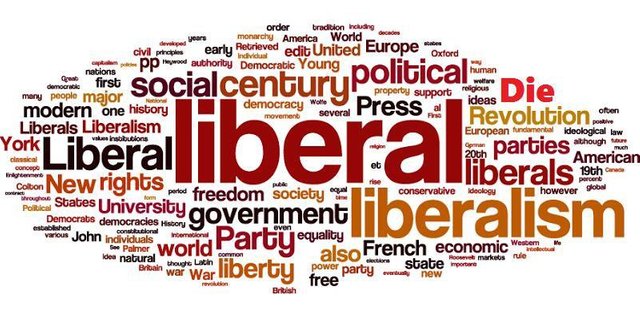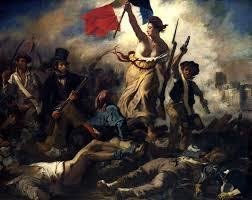Liberalism

Liberalism is a political philosophy or worldview founded on ideas of liberty and equality. Liberals espouse a wide array of views depending on their understanding of these principles, but generally they support ideas and programmes such as freedom of speech, freedom of the press, freedom of religion, free markets, civil rights, democratic societies, secular governments, gender equality and international cooperation. 
Liberalism first became a distinct political movement during the Age of Enlightenment, when it became popular among philosophers and economists in the Western world. Liberalism rejected the prevailing social and political norms of hereditary privilege, state religion, absolute monarchy and the divine right of kings. The 17th-century philosopher John Locke is often credited with founding liberalism as a distinct philosophical tradition. Locke argued that each man has a natural right to life, liberty and property, while adding that governments must not violate these rights based on the social contract. Liberals opposed traditional conservatism and sought to replace absolutism in government with representative democracy and the rule of law.
Leaders in the Glorious Revolution of 1688, the American Revolution of 1776 and the French Revolution of 1789 used liberal philosophy to justify the armed overthrow of royal tyranny. Liberalism started to spread rapidly especially after the French Revolution. The nineteenth century saw liberal governments established in nations across Europe and South America, whereas it was well-established alongside republicanism in the United States. In Victorian Britain it was used to critique the political establishment, appealing to science and reason on behalf of the people. Before 1920, the main ideological opponent of classical liberalism was conservatism, but liberalism then faced major ideological challenges from new opponents: fascism and communism. During 19th and early 20th century liberalism in the Ottoman Empire and Middle East influenced periods of reform such as the Tanzimat and Al-Nahda, as well as the rise of secularism, constitutionalism and nationalism. These changes, along with other factors, helped to create a sense of crisis within Islam, which continues to this day. This led to Islamic revivalism.
During the 20th century, liberal ideas spread even further as liberal democracies found themselves on the winning side in both world wars. Historian Martin Conway argues: "Liberalism, liberal values and liberal institutions formed an integral part of that process of European consolidation. Fifteen years after the end of the Second World War, the liberal and democratic identity of Western Europe had been reinforced on almost all sides by the definition of the West as a place of freedom. Set against the oppression in the Communist East, by the slow development of a greater understanding of the moral horror of Nazism, and by the engagement of intellectuals and others with the new states (and social and political systems) emerging in the non-European world to the South". As a consequence, liberal values were acquiring a wider currency, transcending the limited contours of liberal parties and electorates, thus becoming part of how West Europeans recognize and communicated with each other.
In Europe and North America, the establishment of social liberalism (often called simply "liberalism" in the United States) became a key component in the expansion of the welfare state. Today, liberal parties continue to wield power and influence throughout the world. However, liberalism still has challenges to overcome in Africa and Asia. The fundamental elements of contemporary society have liberal roots. The early waves of liberalism popularised economic individualism while expanding constitutional government and parliamentary authority. One of the greatest liberal triumphs involved replacing the capricious nature of absolute royal rule with a decision-making process encoded in written law. Liberals sought and established a constitutional order that prized important individual freedoms, such as freedom of speech and freedom of association; an independent judiciary and public trial by jury; and the abolition of aristocratic privileges.
These sweeping changes in political authority marked the modern transition from absolutism to constitutional rule. The expansion and promotion of free markets was another major liberal achievement. However, before they could establish markets liberals had to destroy the old economic structures of the world. In that vein, liberals ended mercantilist policies, royal monopolies and various other restraints on economic activities. They also sought to abolish internal barriers to trade – eliminating guilds, local tariffs, the Commons and prohibitions on the sale of land along the way. Later waves of modern liberal thought and struggle were strongly influenced by the need to expand civil rights. Liberals have advocated gender equality and racial equality in their drive to promote civil rights and a global civil rights movement in the 20th century achieved several objectives towards both goals.
In Europe, liberalism has a long tradition dating back to 17th century. Scholars often split those traditions into British and French versions, with the former version of liberalism emphasising the expansion of democratic values and constitutional reform and the latter rejecting authoritarian political and economic structures, as well as being involved with nation-building. The continental French version was deeply divided between moderates and progressives, with the moderates tending to elitism and the progressives supporting the universalisation of fundamental institutions, such as universal suffrage, universal education and the expansion of property rights. Over time, the moderates displaced the progressives as the main guardians of continental European liberalism. A prominent example of these divisions is the German Free Democratic Party, which was historically divided between national liberal and social liberal factions.